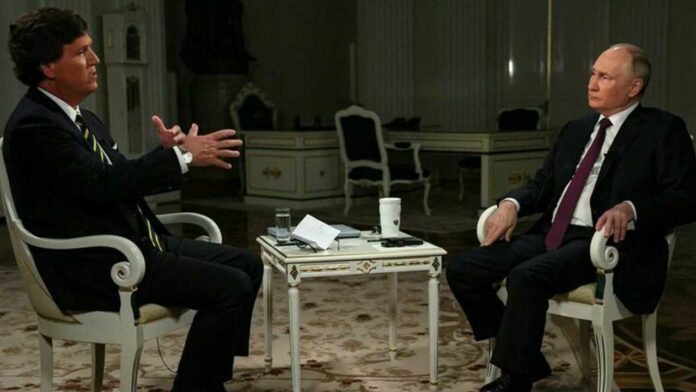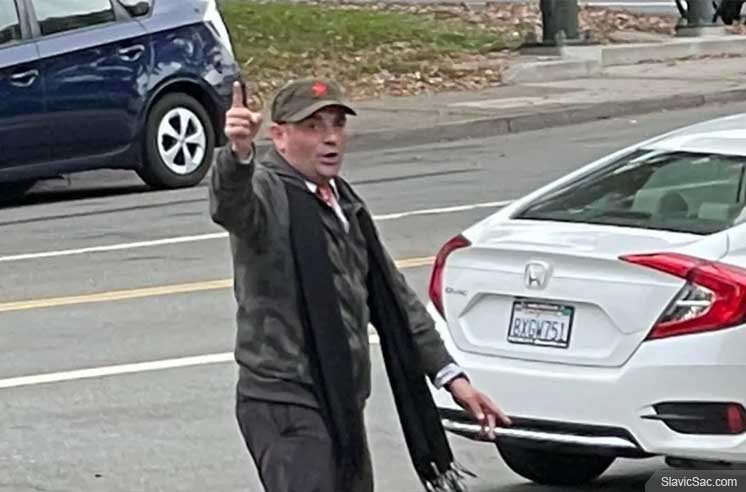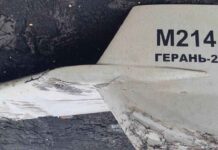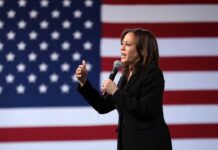American journalist Tucker Carlson interviews aspiring “historian” and President Vladimir Putin.
At the beginning of February 2024, news broke that renowned political journalist Tucker Carlson would be traveling to snow-covered Moscow for an exclusive interview with Russian President Vladimir Putin. Putin, an established candidate for the upcoming March presidential elections, is vying for another six-year term as the head of the Russian state.
During the interview, conducted in the grandeur of the Moscow Kremlin’s dimly lit chamber, Carlson appeared somewhat apprehensive, perhaps understandably so. Across from him sat a man whose recent years have been marked by geopolitical maneuvering and territorial reclamation.
It’s worth noting that the president likely aimed to appear as a congenial conversationalist, perhaps as a strategic move for both the Russian audience and to show Carlson who was in control.
As the conversation commenced, it was clear that Putin intended for it to be substantive and devoid of levity. Despite Carlson’s attempts to inject humor into his questions, the Russian president remained resolute, signaling a commitment to serious discourse.
On Ukraine, Putin regaled Tucker with a narrative tracing the country’s origins, harking back to ancient history, citing the founding of the Old Russian state in 862, with Great Novgorod initially assuming the mantle of Russia’s capital for its formative two decades. Subsequently, governance shifted to Kiyv, now the capital of Ukraine, which presided as the principal city of Russian lands from 882 to 1240. Moscow’s emergence in 1147 also factored into Putin’s reasoning, suggesting a historical basis for Russian territorial claims, even in contemporary times.
Putin’s narrative seemed to suggest that, by extension, Russia held a historical claim to Ukraine, justifying potential actions such as the 2014 annexation of Crimea.
In my personal opinion, all of modern Russia should be governed from Kyiv then. After all, that city was the center of all territories for several centuries. Why not return the power over the state to the rightful hands of the historical capital?
However, such a proposition appears more as an attempt to impose his viewpoint rather than a logical assertion, reflecting a one-sided narrative tailored to his own convenience.
Carlson sought to navigate the conversation from diverse perspectives, only to encounter Putin’s steadfast defense of his actions.
However, Putin’s demeanor throughout the interview raised eyebrows. His propensity for joviality, particularly in light of the ongoing conflict with Ukraine, struck a dissonant chord. Notably, Putin’s government has censored references to the conflict as a “war,” with dissenters facing severe repercussions, such as long-term prison sentences, underscoring the authoritarian nature of his regime.
Putin levied accusations of undermining the Nord Stream pipeline—an incident met with Carlson’s laughter. Nord Stream is a network of offshore natural gas pipelines that run under the Baltic Sea from Russia to Germany to provide Western Europe with natural gas.
As the interview progressed, Putin pivoted to critique U.S. foreign policy, attributing Ukraine’s resistance to Russian influence to American meddling. He highlighted Soviet-era contributions to Ukraine’s development while sidestepping Ukraine’s contributions to modern Russia during their shared history from 1922 to 1991.
The interview often descended into a monologue, with Putin pontificating at length and drawing comparisons with other nations. His admonition for America to address its foreign debt and border issues rang hollow in light of the mass exodus of Russians seeking refuge in the United States following the outbreak of a full-scale war in 2022.
Despite being the world’s largest country by area, Russia grapples with significant social issues, including widespread poverty. The minimum wage and pensions hover around $200 per month, a stark contrast to the president’s claims of economic superiority over European nations, despite facing sanctions from adversaries.
During the interview, Carlson queried Putin about the timing of potential military action against Ukraine, suggesting that such aggression might have been expected earlier in Putin’s tenure. Putin attributed his restraint to a desire for understanding from Western leaders, adamantly rejecting the notion of military conflict with Ukraine.
However, Putin’s selective memory conveniently overlooks the international recognition of Ukraine’s territorial integrity since 1991, including by Russia itself. His assertions about the suppression of the Russian language in Ukraine fail to resonate with those familiar with the linguistic landscape of the region.
Putin reminisced about his youth and traveled from Saint Petersburg to Kiyv and all the way to the Black Sea, where he encountered Romanians and Hungarians dressed in traditional attire and speaking their native languages. Yet, this attempt at cultural juxtaposition fell flat, given the cultural diversity and linguistic freedom inherent in Western societies like the United States.
The Russian leader emphasizes that he did not start the war in Ukraine, but is only trying to end it. He believes that the authorities in Kiyv have been mistreating people from the Donbass region (eastern Ukraine) since 2014.
During that time, Putin ordered Russian troops to occupy the Crimean peninsula and covertly supported separatists along Russia’s western borders until 2022. Moreover, Russia has initiated two wars on its own territory – in Chechnya.
Turning to international relations, Putin touted his alliance with China and predicted the decline of the US dollar’s global dominance, cautioning against American arrogance.
Carlson raised the case of imprisoned U.S. journalist Evan Gershkovich, which prompted Putin to pledge discussions while highlighting perceived American obstinance. Putin drew parallels between Gershkovich and a military figure who purportedly mistreated Russian soldiers during the Chechen wars.
In conclusion, Putin’s interview hints at ambitions beyond Ukraine, suggesting a willingness to annex neighboring territories, perhaps even alluding to Alaska.
His rhetoric about fighting NATO and Western countries in Ukraine masks underlying motives, revealing a calculated strategy to assert dominance over smaller neighbors. Why not go directly to war with the “perpetrators of Ukrainian resistance”? He probably realizes that he will not be able to cope with such a force. It is easier to bomb a neighboring state, which is 28 times smaller in area than the territory of the largest country in the world.
Виталий Атаев Трошин, SlavicSac.com
California Local News Fellowship






